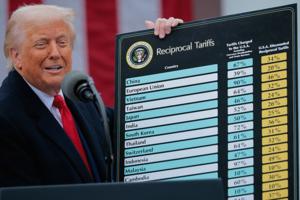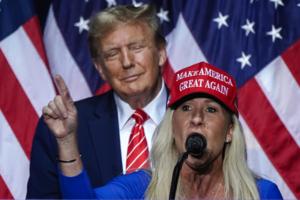Politics
/ArcaMax

Frank Barry: To save Catholicism, let's talk nuns, not popes
The election of an American pope, Leo XIV, is a fitting culmination of a conclave that had the feel of an American presidential election, except shrouded in secrecy and mercifully brief.
Conservatives and liberals rallied around their favorite candidates, dished dirt on the opposition and adopted slogans (“unity” and “diversity”) aimed...Read more

Editorial: A global drug supply chain is actually a good thing
By all indications, the pharmaceutical industry won’t be spared from tariffs. In April, the Commerce Department took its first step toward imposing levies on drug imports. The goal, according to the White House, is to encourage companies to manufacture in the U.S.
Yet tariffs are unlikely to increase American self-sufficiency anytime soon. ...Read more

Commentary: The high cost of California's green energy policies
Since the early 2000s, governors and legislators from both parties have signed onto a climate agenda in California that is making energy steadily unaffordable.
Gasoline in California, according to AAA, which tracks national gas prices daily, costs an average of about $4.78, compared with $3.16 nationally. The cost of electricity in the state is...Read more

Commentary: What to give Americans for Mother's Day? More than a baby bonus
Ahead of Mother’s Day this year, the White House has been exploring various policies to boost America’s low birth rate, including a baby bonus (i.e. government cash transfers at the time of a child’s birth).
This may sound like a strong incentive to have more children, but even though quite a few countries have attempted this (Canada, ...Read more

Howard Chua-Eoan: Pope Leo XIV can take Catholics in III directions
A family of seagulls — two adults feeding a chick — had gathered by the papal chimney a couple of minutes before white smoke billowed out to announce the election of a new pope. The Holy Spirit is usually represented by a dove, so what to make of this trinity?
In any case, it’s just one small detail in a poignant day. There are already ...Read more

Mark Gongloff: Pope Leo XIV might be the climate champion we need
In picking a new leader of the world’s 1.4 billion Catholics, the Vatican had a chance to honor the late Pope Francis’ legacy as the greenest pope in modern history. In choosing the American (and Peruvian) Cardinal Robert Prevost — henceforth known as Pope Leo XIV — his fellow cardinals appear to have seized that opportunity. Humanity’...Read more

Patricia Lopez: US citizenship could soon look very different
Nearly four months into his second term, it’s becoming clear that President Donald Trump’s xenophobic views on immigration are reshaping what it means to become a U.S. citizen.
His vision tilts heavily toward the wealthy and well-to-do, with special shortcuts for them and barriers to entry for the rest — particularly the world’s ...Read more

Commentary: Tariffs on meds will make America sick
During the past few weeks, President Donald Trump’s on-again, off-again tariff wars have rattled the stock market, decimated many Americans’ retirement funds and promised to send grocery prices soaring — and his administration hasn’t even gotten to critical pharmaceutical tariffs yet. But that will likely be the next shoe to drop.
Trump...Read more

Commentary: Without compassion, America will never be great
New York Times Opinion Columnist David Brooks recently published a column with a title pointing to “Trump’s Single Stroke of Genius.”
This immediately caught my attention. Brooks is not a great fan of President Donald Trump, to say the least, yet, he conceded that the administration exudes relentless energy, noting “I don’t know ...Read more

Commentary: NPR and PBS aren't threats. They're treasures
When President Donald Trump signed an executive order last week cutting federal funding for National Public Radio and the Public Broadcasting Service, he was right about one thing: We do live in a moment of media abundance.
But his market-based notion of abundance fundamentally misunderstands the purpose of public broadcasting, which is not ...Read more

Commentary: Progressives have religious freedom too
At the end of March, the Supreme Court heard arguments in a case about religious freedom. In late April, it heard two more. By summer, the Court could decide to give religious employers another tax break, let religious parents excuse their children from classes that mention queer people, and give religious charter schools access to public ...Read more

Commentary: Californians must refuse to abandon the immigrants among us
As immigration scholars, we’ve long studied the policies and politics that shape how people cross borders, build communities and seek opportunity. We’ve interviewed families, analyzed survey data, collaborated with immigrant organizations, informed local governments and documented the complex ways in which immigration law shapes everyday ...Read more

Editorial: Welcome, Pope Leo XIV, Chicago's holy father
When Pope John Paul II visited Chicago in 1979, an estimated 1.5 million people flocked to see the Holy Father, who said a three-hour Mass in Grant Park. This newspaper called it “the largest crowd ever assembled in one place in Chicago history.”
And for decades, a visit from the pope felt like the best Chicago Catholics could ever hope for...Read more

Gustavo Arellano: Trump is wrong. My dad was a trucker, and he didn't need much English to do his job
When Donald Trump signed an executive order last week cracking down on truckers who don't speak the best English, there was one industry expert I needed to call: my dad.
Lorenzo Arellano drove big rigs across Southern California for 30 years before retiring in 2019. His six-day workweeks kept us well-fed and clothed and allowed him to afford a ...Read more

Commentary: Why cutting the Department of Energy's budget is a good thing
Media coverage of President Donald Trump’s recommended Department of Energy budget has been predictably negative. It has focused heavily on his proposed cuts, with the word “slash” appearing in numerous headlines. But his budget is more accurately described as a major policy shift—and a very beneficial one.
If Congress passes this ...Read more

Commentary: The calculated dismantling of minority business opportunity in America
A recent executive order to dismantle the Minority Business Development Agency (MBDA) is another policy change in America's long history of systematically suppressing minority economic advancement. This decision, which threatens to unravel decades of progress in fostering minority entrepreneurship, demands immediate attention and action.
Since ...Read more

Editorial: With Trump stuck on tariff repeat, UK and India make a big, beautiful deal
The greenback sank against the British pound Tuesday as the United Kingdom signed a new, tariff-busting trade deal with India that is a prime new example of how countries around the world can work around the United States and its tariff-obsessed president.
India and the United Kingdom are the fifth and sixth largest economies in the world and ...Read more

Commentary: 250 years after saving America's bacon, French have little taste for what Trump dishes out
PARIS — Au revoir, America. Bonjour, tristesse, France. If that's overstated, it's not by over-much.
Here in April, in the month and the place of falling rain and falling in love, I found that the rain had not changed much — but the "love" part had.
If my random and unscientific survey of some French opinion at all represents the nation as...Read more

Patricia Murphy: Sen. MTG? Like Trump's return, it could happen
Donald Trump held his first major rally of the 2024 campaign in Texas. But he gave a shoutout from the stage to Georgia’s U.S. Rep. Marjorie Taylor Greene, who had traveled with him.
“Marjorie Taylor Greene, you happen to be here,” Trump said with a smile. “Would you like to run for the Senate? I will fight like hell for you, I tell ...Read more

Editorial: Trump's smear campaign: Claims against Kilmar Abrego García are a weak cover up
Unable to make a case in court against Kilmar Abrego García, the man illegally deported to the notorious CECOT mega-prison in El Salvador, federal investigators have focused on smearing his character. Their target now: a traffic stop in Tennessee three years ago that ended without major incident and does not appear to have attracted much law ...Read more


























































